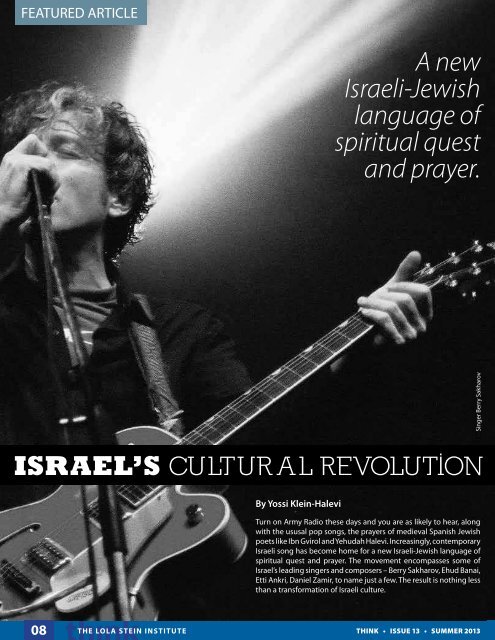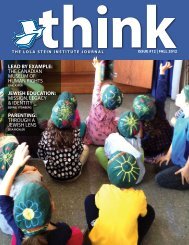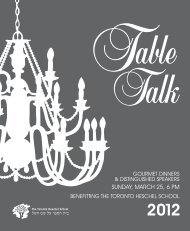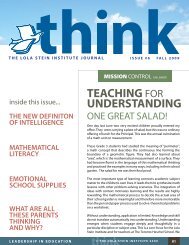Issue No. 13 - The Toronto Heschel School
Issue No. 13 - The Toronto Heschel School
Issue No. 13 - The Toronto Heschel School
Create successful ePaper yourself
Turn your PDF publications into a flip-book with our unique Google optimized e-Paper software.
FEATURED ARTICLE<br />
By Yossi Klein-Halevi<br />
A new<br />
Israeli-Jewish<br />
language of<br />
spiritual quest<br />
and prayer.<br />
ISRAEL’S CULTUR AL REVOLUTION<br />
Turn on Army Radio these days and you are as likely to hear, along<br />
with the ususal pop songs, the prayers of medieval Spanish Jewish<br />
poets like Ibn Gvirol and Yehudah Halevi. Increasingly, contemporary<br />
Israeli song has become home for a new Israeli-Jewish language of<br />
spiritual quest and prayer. <strong>The</strong> movement encompasses some of<br />
Israel’s leading singers and composers – Berry Sakharov, Ehud Banai,<br />
Etti Ankri, Daniel Zamir, to name just a few. <strong>The</strong> result is nothing less<br />
than a transformation of Israeli culture.<br />
Singer Berry Sakharov<br />
<strong>The</strong>se are prayers written with a modern sensibility, at once ironic<br />
and anguished. <strong>The</strong> musicians argue with God even as they seek His<br />
Presence. In Aneh Li (Answer Me), Ehud Banai, this generation’s great<br />
Hebrew balladeer, compares his frustration at not hearing God’s<br />
voice to a broken phone connection: “Maybe it’s the wrong number,<br />
maybe a malfunction/ Maybe we should hang up and try again.”<br />
In Ayekah (Where Are You), actor-turned-singer Shuli Rand admits,<br />
“Master of the Universe, if we can speak frankly/sometimes I have no<br />
strength to live in Your world. ” And in Shelcha La’Ad (Forever Yours),<br />
Yehudah Poliker, son of Greek Holocaust survivors, challenges God:<br />
“How could You have abandoned them/the chimney’s smoke is<br />
forever Yours. ”<br />
God has become a major protagonist in Hebrew song.<br />
Modern Hebrew music is an unlikely vehicle for the re-Judaization<br />
of Israeli culture. Hebrew music – for Israelis, the most beloved art<br />
form created by the Zionist renaissance – was initially intended as<br />
the carrier of the secular Zionist ethos, the revolt against religion.<br />
God is hardly mentioned in the old songs, which instead celebrated<br />
the reborn nation and the flowering land.<br />
Israeli musicians are drawing on our shared cultural<br />
traditions.<br />
That music was almost entirely Ashkenazi. Israel’s Sephardi majority,<br />
whose music naturally embraced religious themes, was effectively<br />
disenfranchised from the mainstream by the Ashkenazi cultural<br />
gatekeepers. Israeli radio barely played the music of Sephardi bands<br />
– the so-called casette music because it was primarily available on<br />
cheap casettes sold around the old Tel Aviv central bus station.<br />
<strong>The</strong> turning point occurred in 1977. With the rise of the Likud in<br />
elections held that year, the Sephardi majority was empowered<br />
politically. And, coincidentally or not, the first Sephardi-led band<br />
to break into the cultural mainstream likewise emerged in 1977.<br />
Habreira Hativit (or the Natural Gathering, as the band called itself in<br />
English) sang Morrocan-Jewish prayers and lamented the spiritual<br />
crisis of traditional Sephardi immigrants in a secular Ashkenazidominated<br />
Israel.<br />
<strong>No</strong>t only are Israelis no longer negating the Diaspora, as<br />
Zionists once did, Israeli musicians are celebrating it.<br />
But by the 1980s, the Habreira Hativit moment seemed to pass,<br />
and Israeli music reverted to its largely secular concerns. Musically,<br />
though, Habreira Hativit left its mark on a wave of east–west<br />
synthesis bands like Mashina and Benzine in the 1980s, followed by<br />
Etnix and Kobi Oz’s Tipex.<br />
<strong>No</strong>t until the end of the 1990s did Israeli music begin to show<br />
renewed interest in spirituality. <strong>The</strong> catalyst was Sheva, which began<br />
as a new age–style band but soon turned to Jewish devotional<br />
music. When the Second Intifada began in September 2000,<br />
bringing the worst wave of terrorism in Israel’s history, young Israelis<br />
felt an urgent need for answers to life-and-death questions. Secular<br />
Zionism had long since lost its vitality and its ability to function<br />
as a substitute faith. And so, young Israelis turned increasingly to<br />
spirituality – and many to Jewish spirituality.<br />
Israel’s rock musicians gave the clearest expression to that longing<br />
for Jewish renewal. Many of them participated in the piyut project,<br />
Yedidi Hashachata (My Friend, Have You Forgotten), sponsored by<br />
Hillel at Hebrew University, which promoted the renewal of piyut,<br />
Sephardi devotional music. Piyut became a primary source of<br />
inspiration for the new Israeli spiritual music. One example: Berry<br />
Sakharov, prince of Israeli hard rock, collaborated with Rabbi Chaim<br />
Louk, the Morrocan-born doyen of Israel’s paytanim, or singers of<br />
piyut.<br />
Along with piyut, Hasidic music – especially the complex musical<br />
tradition of Breslev – has become increasingly influential in<br />
contemporary Israeli music. <strong>The</strong> latest trends indicate a merging<br />
of Sephardi and Ashkenazi devotional music, creating an Israeli<br />
sythesis.<br />
<strong>The</strong> implications for the Disapora–Israeli relationship are profound.<br />
So long as Hebrew music dealt primarily with internal Israeli themes<br />
and expressed the emergence of a new Israeli culture, Diaspora<br />
Jews were largely excluded from the conversation. But now, Israeli<br />
musicians are drawing on our shared cultural traditions. <strong>No</strong>t only<br />
are Israelis no longer negating the Diaspora, as Zionists once did,<br />
Israeli musicians are celebrating it.<br />
My hope is that the new Israeli music will be an educational<br />
and experiential bridge between Diaspora and Israeli Jews, a<br />
transcendent language Jews can share, wherever they live.<br />
Here is a very partial list of<br />
some of the most notable<br />
Israeli-Jewish spiritual albums:<br />
Rabbi Chaim Louk, Chayeh Olamim (Eternal Life)<br />
Shuly Rand, Nekudah Tova (Good Point)<br />
Yonatan Razel, Bein Hatzlilim (Between the Sounds)<br />
Eti Ankri, Yehudah Halevi<br />
Berry Sakharov, Ibn Gabirol<br />
Ehud Banai (anything by Ehud Banai)<br />
Meir Banai, Shma Koli (Hear My Voice)<br />
Habreira Hativit (any of their collected works)<br />
Sheva, Yom Valayla (Day and Night)<br />
Yossi Klein-Halevi is a senior fellow of the Shalom Hartman<br />
Institute and a member of its iEngage research team. He is author<br />
of the forthcoming book Like Dreamers: <strong>The</strong> Israeli Paratroopers<br />
Who Reunited Jerusalem and Divided a Nation.<br />
08<br />
think • issue <strong>13</strong> • SUMMER 20<strong>13</strong><br />
09






